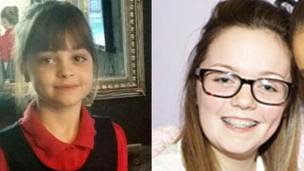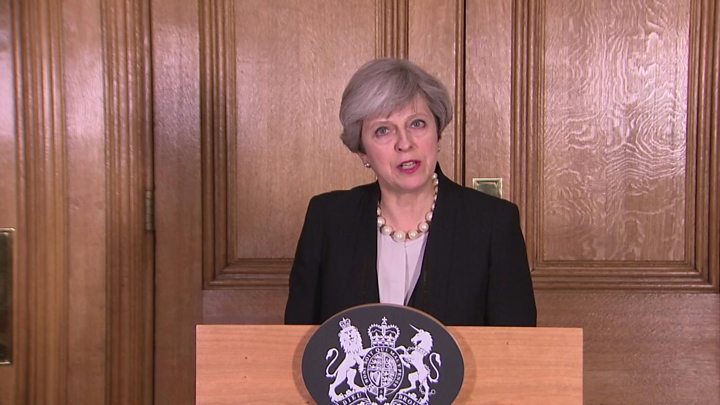Police 'not sharing information with US'
Police investigating the Manchester Arena bomb attack have stopped sharing information with the US after leaks to the media, the BBC understands.
UK officials were outraged when photos appearing to show debris from the attack appeared in the New York Times.
It came after the name of bomber Salman Abedi was leaked to US media just hours after the attack, which left 22 dead.
Theresa May said she would tell Donald Trump at a Nato meeting that shared intelligence "must remain secure".
The Queen is at the Royal Manchester Children's Hospital visiting some of the injured as well as members of the emergency services.
Advertisement
Families' distress
In total eight men are now in custody following Monday's attack at an Ariana Grande concert at Manchester Arena, in which 116 people were also injured. It was carried out by Manchester-born Abedi, a 22-year-old from a family of Libyan origin.
The arrests have been "significant" while searches of premises had also yielded items "important to the investigation", Greater Manchester Police said.
It has also emerged two people who had known Abedi at college made separate calls to a hotline to warn the police about his extremist views.
In other developments:
- A minute's silence was held at 11:00 BST in remembrance of those who lost their lives or were affected by the attack
- Two men were arrested following a search of an address in the Withington area of Greater Manchester on Thursday morning, taking the number of people held to eight
- Manchester City and Manchester United have jointly pledged £1m to an emergency fund set up to support the victims
- A possible suspicious package was declared safe after army bomb disposal experts were called to a street in Hulme, near Manchester city centre
- The Conservatives and Labour are to resume local general election campaigning on Thursday, and national campaigning on Friday
Greater Manchester Police hopes to resume normal intelligence relationships - a two-way flow of information - soon but is currently "furious", the BBC understands.
Its chief constable Ian Hopkins said the recent leak had caused "much distress for families that are already suffering terribly with their loss.".
The force - which is leading the investigation on the ground - gives its information to National Counter-Terrorism, which then shares it across government and - because of the Five Eyes intelligence sharing agreement - with the US, Australia, Canada and New Zealand.
Home Secretary Amber Rudd had said she was "irritated" by the disclosure of Abedi's identity against the UK's wishes and had warned Washington "it should not happen again".
However, the pictures of debris - which appear to show bloodstained fragments from the bomb and the backpack used to conceal it - were subsequently leaked to the New York Times, prompting an angry response from within Whitehall and from UK police chiefs.
- Live: The latest from the investigation
- The victims of the Manchester attack
- What we know so far
- What Libya tells us about Manchester bomber
- Who was the suspect Salman Abedi?
BBC security correspondent Gordon Corera says UK officials believe that US law enforcement rather than the White House is the likely culprit for the leaks.
A Whitehall source described the second US leak as "on another level", and said it had caused "disbelief and astonishment" across the British government.
Analysis
By Dominic Casciani, BBC home affairs correspondent
The police decision to stop sharing information specifically about the Manchester attack with their security counterparts in the US is a hugely significant move and shows how angry British authorities are.
The information from the crime scene wasn't shared on a whim: the British and Americans have a lot of shared world-leading expertise in improvised explosive devices and scientists would be discussing whether the Manchester device tells them something new that could, ultimately, track down a bomb-maker.
Other sharing will continue. The UK and US share a vast amount of information about terror and espionage threats - its a tight-knit network that also encompasses Canada, Australia and New Zealand.
That system is based on trust and the "control principle": if a piece of intelligence is shared, the receiving nation has no right to further disseminate it without permission.
The UK's National Police Chiefs' Council described the "unauthorised disclosure" as a breach of trust which had potentially undermined a "major counter-terrorism investigation".
Counter-terrorism detectives have spoken in the past about how a delay of about 36 hours before the public know who is being investigated can allow known associates of the suspect to be arrested without being tipped off.
Greater Manchester Mayor Andy Burnham said the leaks had worried him "greatly", and he had raised them with the US ambassador.
Lord Blair, who was the head of the Metropolitan Police at the time of the bombings in London on 7 July 2005 said intelligence leaks by the US were not new.
"I'm afraid it just reminds me exactly of what happened after 7/7 when the US published a complete picture of the way the bombs in 7/7 had been made up," he said.
"It's a different world in which the US operate in terms of how they publish things and this is a very grievous breach but I'm afraid it's the same as before."
What's happening with the investigation?
Eight men and one woman have been arrested in the UK since Monday night, including Abedi's older brother Ismail, 23. The woman has since been released.
Abedi's younger brother Hashem, 20, was held by special forces linked to the interior ministry in the Libyan capital Tripoli, as was their father.
Speaking on Wednesday, Greater Manchester Chief Constable Ian Hopkins said: "It's very clear that this is a network that we are investigating.
"And as I've said, it continues at a pace. There's extensive investigations going on and activity taking place across Greater Manchester."
As part of their investigation, police raided a block of flats near Manchester Piccadilly station in the city centre, requiring them to carry out a controlled explosion and briefly close the railway line.
Police carried out another controlled explosion in the early hours of Thursday morning at an address in the Moss Side area of Manchester.
Anyone with information can call the anti-terror hotline on 0800 789321.
Related Articles
🌏Manchester bombing arrests significant, say police READ MORE
🌎Manchester suicide bomber Salman Abedi linked to key UK IS recruiter READ MORE
🌏Britain stops sharing information with US over leaks of Manchester bomb pictures READ MORE



















